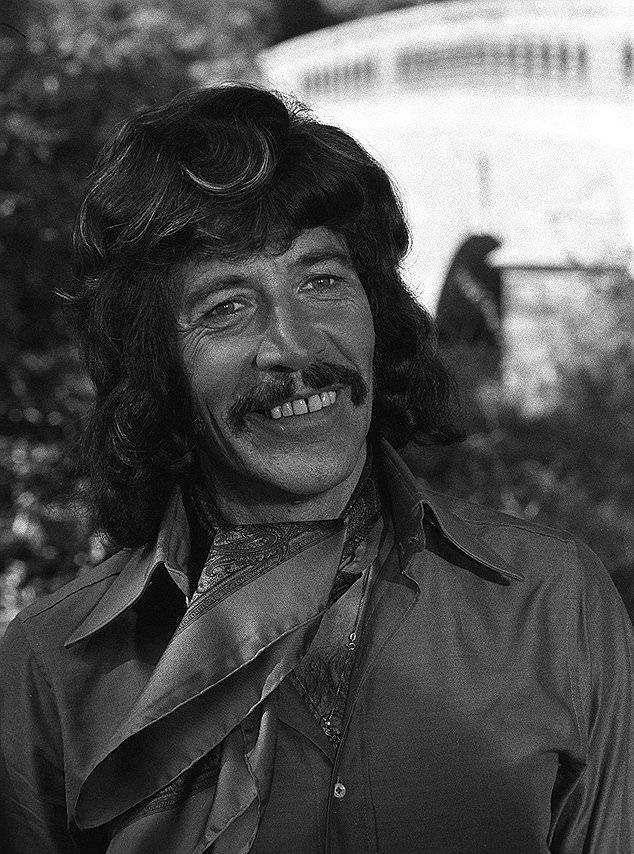
Please note that some of the additional information provided here by the journalist named below may not be accurate, so it should be treated with caution.
September 1973
Tea and honey…
with the King of Siam
It was not the sultry, ultra-sophisticated Jason King I’d love women the world over all the stern, anti-feminists, oriental King and I Peter Wyngarde that I met for afternoon tea on a sunny Yorkshire hotel terrace last week. No dark glasses. No dramatics in dress. No champagne with oysters. The man himself – in casual, rolled up jeans and open floral shirt with unfreaked hair combed soft just as it grows is more devastating than all the images we have of him on stage and screen rolled into one.
Eyes incredibly blue, smile with a disarming friendliness, this is a man happy in the sun, and at peace with the world. It’s communicating peace too; a shared contemplation of blue skies, green gardens and the grey stonework of the fine mediaeval building behind us. “I like to find somewhere like this, quiet and away from it all.
“This part is 13th Century common and from that line though this side was added in 1845 – quite well I thought,” he explained with a sweep of his arm. The art of the actor is put aside – for the moment he is content to forget all matters theatrical and recount some of the history of the Hall. This is only a second stay here yet already he is familiar with pedigree and past, characteristics of the care and attention to detail prevalent in all his work.
Obviously Peter Wyngarde (king of small screen, stage and fashion), has a great feeling for all buildings and the great outdoors. He squirms bare feet into sparse sandals and squares up to a tiny table to do homage to another great love… tea! Lid carefully lifted; pot softly stirred (“I think it will be alright”) and a hitherto quite indifferent liquid poured to perfection.
He waits patiently – and a girl brings honey. That the Wyngarde way to take tea, I mentally kicked myself for having plonked white cube sugar in my (which I hate) and resolve to make with the honey for a second cup – which I did – and it’s delicious!
When the girl returns (ostensibly for the tray, but really to request a handful of autographs), books are duly signed but the pot is not relinquished until it yields up a third cup. “Don’t take it just yet. Tea is a firm favourite of mine and, as you know, I drink it by the bucketful,” he reminds her. Despite attentive pouring, the final offering comes with a floating leaf or two. The now empty teapot is carefully observed. “Oh, I see what is the matter. You’ve used quick brew tea and the strainer isn’t right for that kind of tea,” he tells her gently.
I remember several nights previously watching this man’s communication with a packed house at Leeds Grand Theatre as the iron King Mongkut. Here and now, he takes time to make a moment of history of one young aspiring waitress. Probably all her future customers will benefit. Certainly, the plain-ordinary English cuppa is elevated to immeasurable heights when truly appreciated. Nor does it need to be served in a chaste silver pot, by chased bronzed Amazon’s, on a mountain top in the French Riviera for this man to take pleasure. Despite the seductions of screen life, Peter Wyngarde preserves intact the art of enjoying the simplistic.
This month, the lavish touring The King and I, in which he stars, visits the Theatre Royal, Nottingham (September 3rd – 15th), and the

New Theatre, Hull (September 17th – 29th) then on to the Palace Theatre, Manchester, from October 1st before opening in London.
It played to packed-solid houses at Leeds Grand Theatre for two weeks in July, and before that with phenomenal success for a full four-week season in the Forum Theatre Billingham.
“I like touring, especially in provincial theatres. They’re not really having a very good time of it. It’s a good thing when one can use the name one has made on television to draw an audience. For instance, we filled a theatre at Billingham every night for four weeks and still people were turned away. We could have stayed there much longer. It is wonderful. But I understand that since we left, they had to close a show midweek. I don’t know what the answer is. You see last nights (this was in Leeds) we had a house full of young people. They loved it. The show is new to them! They went overboard for the songs shouted for uncles comment cheered, just like a pop concert. It’s marvellous”.
He ponders some more on the difficulties surrounding live theatre day today. “A lot of the traditions have gone. When a country loses its traditions, its lost”.
He counters my suggestion that perhaps the pull of so many other leisure entertainment lures “people away from the theatre with the reply, “I believe in competition. It’s healthy. But you see, television can be rather like a two-headed monster. It can strip away the mystery – bear the technicalities. When I go to the theatre, although I’ve been in it myself for so many centuries, I still want to believe that it’s true. It’s magic. One has to retain that. If you’re going to show the cameras, and the way this and that is achieved of course, the magic is lost”.
He takes a cigarette (one of the ten he’s allowed each day – doctor’s orders) and shows me the nicotine deposit in his cigarette holder. “Look at that. That’s from just, how many I had today – three/four cigarettes. I know it’s very bad for me. But I get so cross and irritable if I don’t smoke. Unbearable”.
The thought that he has to look after his voice now that he’s a singer, makes him laugh out loud. “Well, it’s not really a singing part. Mine are speaking-out songs, if one can call it that. The ‘Puzzlement’ piece is a tongue twisting one at that. Does it come over alright?” he asks.
Has he been in a musical before? “Yes, I played in Brecht’s The Good Woman Of Setzuan. I took the part of Yang Sun, a Chinese pilot. It’s strange, I hadn’t thought of it ‘til now, that in the two musical plays I’ve been in, I should play an oriental”.
What about clothes? One of the several awards he has gained with Jason King is ‘The Best Dressed Man In Britain’.
“Yes, clothes are very important to me. I think see things mostly in shapes, through the eye not the ear. Perhaps that means I have no right to be in musicals! I draw a shape. I see characters as shapes and before I know it, I’m designing clothes”. His interpretation in The King and I is powerful and moving. He has given a barbaric splendour to the two full-length caftans, heavily encrusted with embroidery, and ablaze with colour. “You should read the original book, it’s remarkable,” he advises.

“The King was truly a tremendous man. He was 63 when he became King, you know. He spent 20 years in a Buddhist monastery, preparing himself to rule Siam, which he knew he would be called upon to do. He was far ahead of his time and did, in fact, have this prim Victorian governess to teach English to his children. She was really the last person to be sent to such a place. Of course, it’s been changed for the stage
– most stories have to be to some degree, but you have to put forward as much of the truth as you can.
“I don’t play the role romantically – he was a very hard man – he didn’t understand the meaning of love; didn’t acknowledge such a thing existed. He’s perplexed by his feelings. The whole thing is of great puzzlement to him. There’s the scene in the library, where he says, ‘But why should I be called upon to discuss matters of importance with… a woman!’ The beginning is there then, it’s definitely there, and he’s greatly puzzled by it. And when he dies her love for him is there too”.
Herein lies is sensitive rendering of the role – he understands the man and the media with which he works himself.
Early this year, in Leeds, we saw him do the same sort of thing in Charles Dyer’s Mother Adam, a part which he says he very much wanted to do, and one that he recalls took a lot longer to get to grips with. He firmly believes that an actor should be a Vagabond (“like the travelling players of longer go”). And says that in the past four years, he’s travelled more than anyone else he knows. Where does this very much travelled man feel most at home? “That’s an interesting question,” he parries. “Well as I said, I love the sun. I love doing nothing in the sun, and I adore Fiji. Went there for a week instead seven! But I should say that it is here in England that I feel most at home. That’s funny because I get very cross sometimes at the way things get done”.
A plane flies over at that moment and ‘at-home’ Peter Wyngarde points a finger skywards, shades his eyes with one hand, and becomes a small boy again. “I take great delight in watching planes go by and recognising what they are. I used to make models when I was a small boy. I know them all,” he says with a grin.
Earlier he’d said, “I think when you’re working in the theatre at night, you shouldn’t do anything at all during the day”. But this busy-doing-nothing time was now drawing to a close. “I’m afraid I shall have to go now. This is sort of a ritual hour,” he said. Tea and honey time, was over.
And the King went away to prepare for the tasks ahead for a new he would be called upon to do many things.
Interview by Joy Jones.
© Copyright The Hellfire Club: The OFFICIAL PETER WYNGARDE Appreciation Society: https://www.facebook.com/groups/813997125389790/


One thought on “INTERVIEW: Leeds and West Riding magazine”